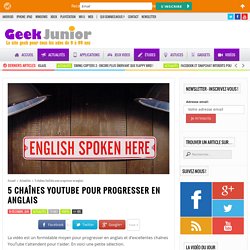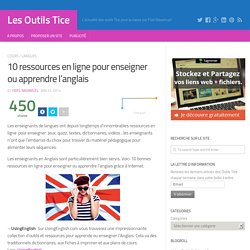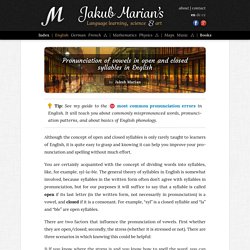

TV & Radios. Grammar & vocabulary. Bbc learning & british council. Stories. 5 chaînes YouTube pour progresser en anglais. La vidéo est un formidable moyen pour progresser en anglais et d’excellentes chaînes YouTube t’attendent pour t’aider.

En voici une petite sélection. Des chaînes YouTube pour améliorer son anglais, il en existe des dizaines. Tu n’as que l’embarras du choix. Les 5 chaînes que nous avons sélectionnées sont très différentes les unes des autres. A toi de regarder quelques vidéos de chaque chaîne pour choisir celles qui correspondent le mieux à tes besoins. Notre préférée : Les Tutos de Huito Si l’anglais n’est pas ta matière favorite au collège ou au lycée, regarde bien la chaîne YouTube Les Tutos de Huito. Les vidéos commencent avec une musique de rock anglais, l’Union Jack qui flotte au vent et apparaît ensuite Steven Huitorel, prof d’anglais en Bretagne qui va nous expliquer de façon ludique des notions de base de l’anglais.
Les auxiliaires en anglais, leçon complète. Teacherdiane. Lesson 1 - "Outdoors" - English Vocabulary. Learn English with Songs - Perfect Tense - Lyric Lab. Crown academy of English. English listening practice - Audio Picture Stories - Beginner level Peterpan. Apprendre l'anglais avec les Tutos de Huito. 10 ressources en ligne pour enseigner ou apprendre l'anglais. Les enseignants de langues ont depuis longtemps d’innombrables ressources en ligne pour enseigner.

Jeux, quizz, textes, dictionnaires, vidéos…les enseignants n’ont que l’embarras du choix pour trouver du matériel pédagogique pour alimenter leurs séquences. Les enseignants en Anglais sont particulièrement bien servis. Voici 10 bonnes ressources en ligne pour enseigner ou apprendre l’anglais grâce à Internet. – UsingEnglish. Sur UsingEnglish.com vous trouverez une impressionnante collection d’outils et ressources pour apprende ou enseigner l’Anglais.
. – EverythingESL. . – CAPL. . – ESL Basics. . – Bab.la Games. The Kings Speech. A guide to learning English. The 101 Best Websites for ESL Students in 2016. The Internet is full of resources for English language learners at the university level. However, the problem lies in which material is valuable and which isn’t. Like with any topic, the internet’s a mix bag. There’s amazing materials for ESL students and also material that could prove detrimental to your learning. If you’re heading off to university or already studying, you don’t have time to surf the net in the hope of finding valuable websites. This is why we’ve created this helpful list of the 101 best websites for ESL students. The list is divided into logical sections, including: Grammar and UsageGrammar CheckWritingReadingSpeakingPronunciationVocabularyListeningAcademic SkillsDictionariesGeneral Academic ResearchIELTS This compilation of websites will blow your mind, and of course improve your English at the same time.
Grammar and Usage Learning grammar is probably one of the most frustrating things for any language learner. . (1) a4esl (2) English Club (3) Using English (4) Grammar Quizzes. English-Guide.org. Parts of Speech. Pronunciation of vowels in open and closed syllables. Tip: See my guide to the most common pronunciation errors in English.

It will teach you about commonly mispronounced words, pronunciation patterns, and about basics of English phonology. Although the concept of open and closed syllables is only rarely taught to learners of English, it is quite easy to grasp and knowing it can help you improve your pronunciation and spelling without much effort. You are certainly acquainted with the concept of dividing words into syllables, like, for example, syl-la-ble. The general theory of syllables in English is somewhat involved, because syllables in the written form often don’t agree with syllables in pronunciation, but for our purposes it will suffice to say that a syllable is called open if its last letter (in the written form, not necessarily in pronunciation) is a vowel, and closed if it is a consonant. There are two factors that influence the pronunciation of vowels.
Conclusion.